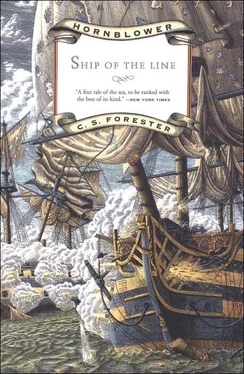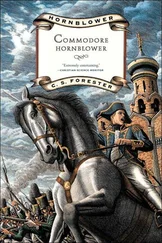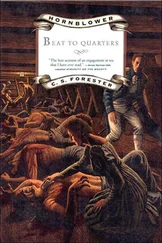Startled, Hornblower looked down at Rosas. There were three serpents issuing out of the fortress—three long narrow columns of troops creeping out on to the plain, one each from the citadel, the village, and the Trinidad. A hoarse shout from the Spanish cavalry picket proclaimed that they had seen the same phenomenon; the little party left their post and rode headlong back to the scattered Spanish army. Hornblower went on staring for two more minutes; the columns showed no sign of ending, but wound on interminably out of the fortifications. Two were heading towards him, while the one from the citadel was taking a different route, off to his right, with the dear intention of cutting off the Spanish retreat to the mainland. Hornblower’s eye caught the flash of musket barrels in the sunlight; still the columns were winding out—there must be a thousand men at least in each. The Spanish information which had estimated the garrison’s strength at two thousand as a maximum must be as faulty as all the rest.
Claros came clattering up with his staff to gaze out over the plain. He paused only for an instant to take in the significance of what he saw—every man with him pointed simultaneously to the outflanking column—and then he wheeled about and spurred back again. As he wheeled his eyes met Hornblower’s; they were expressionless as ever, but Hornblower knew what he intended. If he abandoned the convoy and marched his men with all haste for the mesa, he could just get away in time, and he was set upon it. Hornblower knew in that instant that there was not the least use appealing to him to cover the retreat of the convoy, even if the Catalans were steady enough to fight a rearguard action against greatly superior numbers.
The safety of the landing party was dependent solely on its own exertions, and there was not a moment to be lost Hornblower scrambled on to his horse—the heads of the French columns were well out on to the plain now, and some would be soon ascending the steep escarpment of the plateau—and dashed back after Claros. Then, as he neared the place where Major Laird had his marines already drawn up into line, he checked the pace of his weary horse to a sober trot. It would never do to display too much haste or anxiety. That would only unsteady the men.
And he had a difficult problem to decide, too. The obvious best course was to abandon everything, guns, stores, and all, and march his men back to the ship headlong. The lives of trained seamen were too valuable to be lightly thrown away, and if he did as common sense directed he would have every man safely on board before the French column caught them up; in any matter-of-fact scale of relative values even a few seamen were worth more than ten twenty-four pounders, and their ammunition and whatever food stuffs had been landed. Yet in war the matter-of-fact frequently held only second place. A headlong flight to the ships, and abandonment of guns and stores, would depress the spirits of the men inordinately; a fighting retreat with next to no loss would raise them. He made up his mind as he halted his horse beside Major Laird.
“We’ll have three thousand French on us in an hour, Laird,” he said quietly. “You’ll have to hold them back while we get the stores on board again.”
Laird nodded. He was a tall red-faced Scot, red-haired and inclined to stoutness; his cocked hat was tilted back off his forehead and he mopped his face with a lilac-coloured silk handkerchief which clashed dreadfully in the sunlight with his red coat and sash.
“Aye,” he said. “We’ll do that.”
Hornblower spared a second to glance down the double line of marines, the homely brown faces under the shakos, and the white cross belts in Euclidean line. The disciplined composure the marines displayed was comforting and reassuring. He kicked his heels into the shaggy sides of his horse and trotted down the path. Here came Longley, tearing back on his pony.
“Ride to the beach, Longley. Tell the admiral it is necessary to re-embark the men and stores, and ask that all the boats of the squadron should be ready to take us off.”
A column of Spaniards was already hurrying off in disorderly fashion up a cross path towards the mainland. A Spanish petty officer was collecting the remainder of his men; a British petty officer was looking on in puzzled fashion as they unhitched a team of horses from one of the guns and began to lead them away.
“Stop!” shouted Hornblower, riding up in the nick of time and delving hurriedly into his mind for adequate Spanish. “We shall keep those horses. Here, Sheldon, Drake, bring those horses back. Brown, ride on. Tell every officer that the Spaniards can go, but they’re not to take a mule or horse with them.”
There were sullen looks among the Spaniards. In a country in whose every corner war had raged bitterly for two years draught and pack animals were of the utmost imaginable value. The meanest Spanish peasant in the ranks knew it, knew that the loss of those animals would mean an empty belly for him in some new campaign a month off. But the British sailors were equally determined. They handled their pistols and cutlasses with every intention of using them if necessary, and the Spaniards remembered the French column which was marching to cut off their retreat. All down the path they abandoned the animals and drew off, sulkily, while Hornblower kicked his weary horse into renewed activity, as he rode along, turning back towards the beach all the guns and material which had been dragged so far with such exertion. He reached the head of the steep gully and rode down it to the beach. On that tranquil afternoon the sea was blue and smooth like enamel; far out the squadron rode peacefully at anchor, and below him lay the golden sand of the beach, while over the enamelled surface plied the boats of the squadron like huge beetles. All round him grasshoppers were singing deafeningly. The beach party was already hard at work re-embarking the beef barrels and bread bags piled there. He could safely leave this part of the work to Cavendish, and he turned back again and rode up the gully. At the top a party of seamen arrived with the first of the mule train. He left orders for the animals to be brought back to the guns as soon as their loads were taken off, and rode on.
The nearest gun was within half a mile of the gully, men and horses labouring to drag it up the path—for this half mile the land sloped away fairly steeply inland from the top of the cliffs. The men gave him a cheer, and he waved his hand and tried to sit his horse as if he were an accomplished rider; it was comforting to think that Brown behind him was an even worse horseman, so that the contrast might help. Then a distant pop-pop-popping, its tone unnatural in the heated air, told him that Laird’s rearguard was in action.
He rode hastily along the path, Brown and Longley at his heels, past the other gun teams labouring on the steep hillsides, towards the firing. At one point along the path there was a long line of cannon-balls, lying where the Spanish carrying party had dropped them when the alarm came. Those would have to be lost—there was no chance at all of getting them back to the ship. He arrived unexpectedly at the scene of the firing. Here the country was a succession of short steep ups and downs, the rocky soil covered with a dense undergrowth, amid which grasshoppers were still singing loudly through the musketry. Laird had his men strung out along the summit of one of the major ridges; Hornblower came upon him standing on a lump of rock overlooking the path, the lilac handkerchief still in one hand and his sword in the other, and muskets banging away all along the ridge on either side of him. He had the air of a man completely enjoying himself, and he looked down at Hornblower with the irritation of a man disturbed while composing a work of art.
Читать дальше









